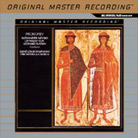March 2006
Thanks to Stalin, then in power, the Russian film studios were forbidden to buy any new equipment from overseas. The music for Nevsky was recorded on equipment comparable to that used in the United States ten or more years earlier, and the musicians were not the best. One of the greatest film scores ever written was recorded with the quality of an intercom conversation. The Capriccio recording makes an effort to set this straight by presenting a new recording of the complete score, with first-rate musicians and superlative sound. It is a dramatic, energetic reading that strives for historical accuracy without compromising immediate impact. Because it was preceded by live performances in Germany that accompanied showings of the film, the tempos are faithful to the original. The Slatkin recording is of the oratorio that the composer fashioned from his film score. It is instructive to note the differences in orchestration and tempo. Slatkin’s is an exciting reading that just misses the sheer brilliance of the work. Slatkin also includes an A+ version of Prokofiev’s music for Lieutenant KijÚ. The sound of both discs is excellent. The Capriccio is exceptionally lucid and has tangible presence. The German-enemy’s horns and trumpets are placed in the rear channels for effect. The Slatkin recording is warmer, very rich and full. Its 4.0-channel configuration keeps the sound up front, with the rear channels used only for natural reverberation. Because they are different works, this is not a case of buy one or the other. Purchase both, obtain the Criterion DVD edition of the movie, which contains a brilliant audio-video essay on the music, and you will have a mini-course on one of the greatest film-and-music collaborations in history. GO BACK TO: |
 Prokofiev - Alexander
Nevsky: Complete Film Music
Prokofiev - Alexander
Nevsky: Complete Film Music Prokofiev
- Alexander Nevsky; Lieutenant KijÚ
Prokofiev
- Alexander Nevsky; Lieutenant KijÚ